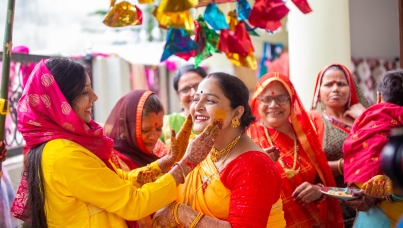World Affairs - Indians foresee dissonance: Halifax International Security Forum-Ipsos Study
New Delhi, January 04, 2019: According to a new study by Ipsos Public Affairs in partnership with the Halifax International Security Forum, there are concerns around personal safety, various threat perceptions and generally a whole lot of chaos in the minds of Indians vis-à-vis macro issues.
How do Indians perceive World Affairs?
Indians have a pessimistic view of World Affairs.
- 69 per cent Indians feel that over last year the world became more dangerous, though down 11 points over previous year.
- 68% Indians see threat of a nuclear, biological or chemical attack taking place somewhere in the world. Though there is a 12 point slide this year.
- 67% Indians agree that there could be another world conflict involving super powers in the next 25 years, identical to World War 1 and 2.
- 52 per cent Indians agree that US President Donald Trump’s approach to world affairs has made the world a safer place today.
How about India?
Concerns around issues remain, but there is a marginal slide in the numbers.
- 71% Indians foresee a major health epidemic breaking out in India in the next one year, though 8 points down from last year.
- 75% Indians foresee threat from natural disaster in India in the next one year, 7 points down from last year.
- 78% foresee threat of terror attack in the next one year. Though down by 7 points this year.
- 74% Indians fear violent conflict breaking out between ethnic or minority groups in India. Though down by 6 points this year.
- 68% Indians fear threat of armed conflict with another nation. Though down by 12 points this year.
- 70% Indians are concerned about threat of personal safety, security for themselves and their family being violated in the next one year. Though there is an 8-point drop from last round.
- 76% Indians are of the view that given India’s difficult economic issues, India needs to focus less on the world and more at home (5% slide from last year).
- 85% Indians feel India has responsibility to be a moral leader in the world and set an example for other countries to follow. Down 6 points.
- 79% Indians feel India should work with other countries towards global goals even if it goes not lead to tangible benefits.
- 78% Indians have reposed their faith in the UN and think it is relevant and important. Only 22 per cent hold a contrary view – that it is outmoded and irrelevant.
- 82 per cent Indians bat for economic power over military power. Down 4 points.
At the same time 77% Indians rationalize govt spends on military, given the dangers in the world.
Parijat Chakraborty, Country Service Line Group Leader Ipsos Public Affairs, Corporate Reputation & Customer Experience sees uncertainty and threat perception dominating the sentiment: “Conflicts, dissonance, disease and chaos continue to flood the mindscape of Indians.”
About the Study
These are some of the findings of an Ipsos poll conducted between October 26 and November 9, 2018, on behalf of the Halifax International Security Forum. The survey instrument is conducted monthly in 27 countries around the world via the Ipsos Online Panel system. The countries reporting herein are Argentina, Australia, Belgium, Brazil, Canada, Chile, China, France, Great Britain, Germany, Hungary, India, Israel, Italy, Japan, Malaysia, Mexico, Peru, Poland, Russia, Saudi Arabia, South Africa, South Korea, Spain, Sweden, Turkey and the United States of America. For the results of the survey presented herein, an international sample of 19,312 adults aged 18-64 in the US and Canada, and age 16-64 in all other countries, were interviewed. Approximately 1000+ individuals participated on a country by country basis via the Ipsos Online Panel with the exception of Argentina, Belgium, Chile, Hungary, India, Israel, Malaysia, Mexico, Peru, Poland, Russia, Saudi Arabia, South Africa, South Korea, Sweden and Turkey, where each have a sample approximately 500+. Weighting was then employed to balance demographics and ensure that the sample's composition reflects that of the adult population according to the most recent country Census data, and to provide results intended to approximate the sample universe.
A survey with an unweighted probability sample of this size and a 100% response rate would have an estimated margin of error of +/-3.1 percentage points for a sample of 1,000 and an estimated margin of error of +/- 4.5 percentage points 19 times out of 20 per country of what the results would have been had the entire population of adults in that country had been polled. All sample surveys and polls may be subject to other sources of error, including, but not limited to coverage error, and measurement error.



